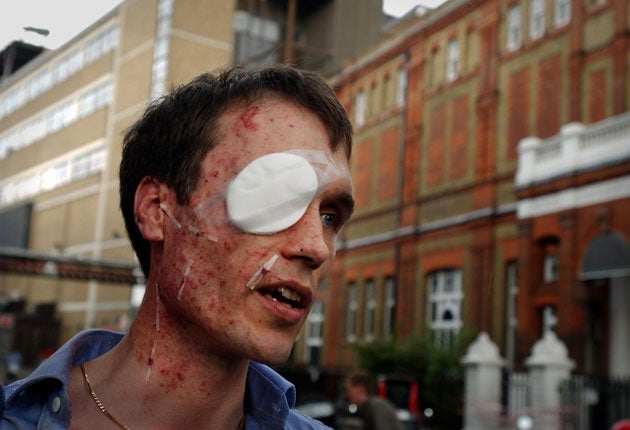Rescuers should be able to choose risks, says 7/7 survivor
Bombing victim tells Jonathan Owen he is pressing coroner to reassess emergency protocols

Your support helps us to tell the story
From reproductive rights to climate change to Big Tech, The Independent is on the ground when the story is developing. Whether it's investigating the financials of Elon Musk's pro-Trump PAC or producing our latest documentary, 'The A Word', which shines a light on the American women fighting for reproductive rights, we know how important it is to parse out the facts from the messaging.
At such a critical moment in US history, we need reporters on the ground. Your donation allows us to keep sending journalists to speak to both sides of the story.
The Independent is trusted by Americans across the entire political spectrum. And unlike many other quality news outlets, we choose not to lock Americans out of our reporting and analysis with paywalls. We believe quality journalism should be available to everyone, paid for by those who can afford it.
Your support makes all the difference.Insurance broker Michael Henning was 10 feet from Shehzad Tanweer, a suicide bomber who blew himself up on a London Tube train at Aldgate station killing seven people and seriously injuring dozens more.
The inquests into the deaths of the 52 victims of the 7/7 bombings last week heard his harrowing account of what happened that day. Henning, 43, told The Independent on Sunday how the experience has driven him to try to ensure there is no repetition of the delays that added to the horror.
"The big myth about the bombings is how those killed died instantaneously and how those that were injured received immediate help. Tragically, nothing could be further from the truth. While there's no doubt the emergency services were quick to get to Aldgate station there was a massive gap between their arrival and them actually getting to the victims.
"I will never forget the screams of pain and anguish from the badly injured, many of whom were dying, some in absolute agony with no trained professionals to help and no pain relief. Even worse, there were people who may have survived had they got the urgent medical response they so desperately needed.
"It was hard giving evidence last week because I knew I was going to be painting a more vivid picture for the families of victims than sanitised police reports portray. I shall never forget the bomb going off and the eerie silence that followed. It was pitch black and I really did think I had died. Only when I felt blood on my face did I realise I was still alive. Shortly afterwards, the tunnel lights came on and the sound of panicked screaming began. As people quickly calmed down, I could hear the desperate and anguished screams of pain from the badly injured.
"When the emergency services were allowed to do their job they were brave and professional but they weren't allowed to do it quickly enough and were hamstrung by protocols. As a result, people died who might have been saved and those beyond saving didn't die with the dignity of pain relief. Some were in agony for half an hour. Put simply, people died without the help they needed.
"Who comes up with rules governing how the emergency services operate I don't know, but whatever the health and safety culture is, surely professionals on the ground must have the choice whether to accept the risk of secondary devices and go to the aid of people in need of help.
"I'm a simple man. I like simple solutions. If there is a legal bar to this then surely there could be a voluntary organisation, made up of doctors, nurses and other emergency specialists, people able and willing to take the risk to go in aid of others. I don't want people to suffer like that again. I am asking Lady Justice Heather Hallett, the coroner, to really look at these protocols and reassess them.
"I suspect most of those working that day would have volunteered to go down into the tunnel sooner if they had been given the chance.
"It struck me that the people who acted first were often those off duty. Take Elizabeth Kenworthy. She was an off-duty policewoman who saved the lives of two people in the bombed carriage. Had she been on duty she'd have probably been held back.
"The vast majority, if not all, of those who work in the emergency services would not hesitate to go to the help of others, despite the risks of a secondary device. But too often they are held back from doing so. This is not an attack on them. They are brave people dedicated to saving lives; it was the system that let them and the victims down.
"It has been a painful journey but I'm one of the lucky ones. I survived. For two years my goal each day was to be alive at the end of it. That's how much it gets to you and I know many survivors still suffer like that. I carry in my wallet the names of the people who died on the Aldgate train. If I ever lose perspective, I pull that out.
"It is time for common sense to come into the equation so we never have another disaster where red tape delays the emergency services."
Join our commenting forum
Join thought-provoking conversations, follow other Independent readers and see their replies
Comments